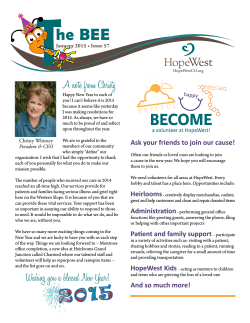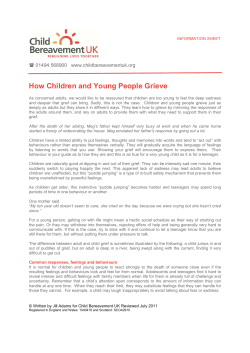
Disenfranchised Grief in Care Settings_Jennifer Moran Stritch
Not Like Us: Disenfranchised Grief in Care Settings JENNIFER MORAN STRITCH SCI/IASW CPD SEMINAR – FEBRUARY 25, 2015 “UNDERSTANDING CHILDREN, LOSS & BEREAVEMENT” What does disenfranchised grief mean? Ken Doka Doka (2002) “the grief that persons experience when they incur a loss that is not or cannot be openly acknowledged, publicly mourned or socially supported. (Doka, pxv) where the relationship is not recognised the loss is not acknowledged the griever is excluded rather than supported What does having a franchise for grief mean? DISENFRANCHISED Loss that “doesn’t deserve your tears” Suicide Death from violence/crime/ “unsavoury” circumstances Overdose/addiction Death from misadventure Death/emotional cutoff after sexual/physical abuse Death after domestic violence Separation/divorce Loss of an extramarital affair Death after an extramarital affair Secret Loss/Loss that is “less than”… Sibling loss - both adult and child Miscarriage Infertility + treatment/interventions Abortion Termination for fatal foetal abnormalities Invisible illness Pet loss Loss that is not human but of a thing Presenting child for adoption – infant + Agreeing to put a child in care (family or system) Death of a co-worker (caring professions?) Not Like Us: “they don’t understand” People with intellectual/physical disabilities People with learning differences People with Autism People with mental illness Elderly people Children/Young People People with Acquired Brain Injury People with Dementia People receiving service – incarceration, homeless, psychiatric, addiction People who are “used to it” due to repeated loss Like us: strong, faithful, professional Social care workers/social workers Gardai First responders Doctors/nurses Funeral & death professionals Teachers/lecturers/counsellors/therapists Clergy/chaplains “the supporter/tea-maker/dishwasher” Individuals with particularly strong/public religious beliefs -> afterlife When grief is disenfranchised…we are not honoured Withdrawal from contact/expression Unable to participate in public rituals Unable to express sorrow or grief Depression Psychosomatic symptoms (particularly for children) Increased risk of prolonged or complicated grief What can we do? So much is internal work (hard to change society overnight!!) Love is love = grief is grief Give time to yourself to grieve this – practical ways? Acknowledge – name the thing (especially for others you support) Create safe/culturally meaningful & appropriate/real spaces/virtual spaces for: talking, remembering, writing, ritual, drawing, Group or individual – may need both simultaneously to work Personal exercise for the caring professional…. Who in my network of relationships is the person most likely to: ask how I am doing be the person I can cry in front of/with do practical things (help clean up, watch the kids so I can have some time, cover my shift, help me write a report, etc.) notice I am not doing well tomorrow, next week, next month start a conversation about the person/thing/relationship I have lost Celebrate a happy memory with me Tell me the truth Be supportive 1 year from now Thank you for sharing this time with me and others present…. Questions, comments, ideas? Jennifer.stritch@lit.ie Twitter: @stritchj References Doka, K. (2002) Disenfranchised Grief: New Directions, Challenges and Strategies for Practice. Chicago: Research Press.
© Copyright 2025





















